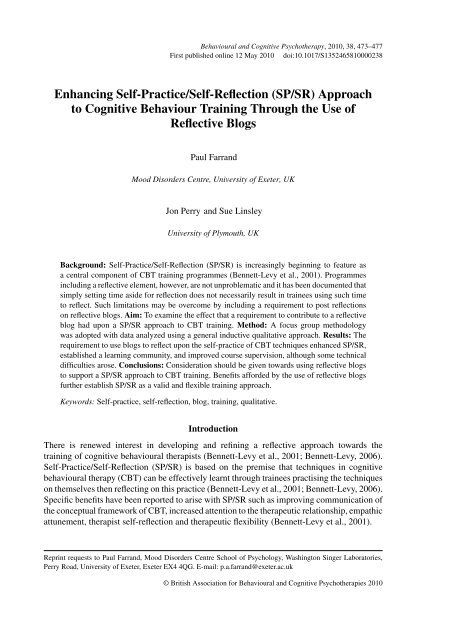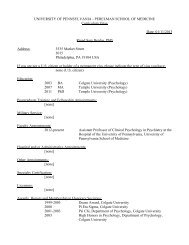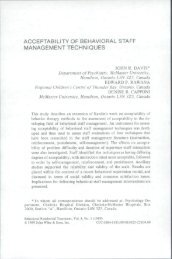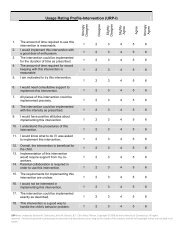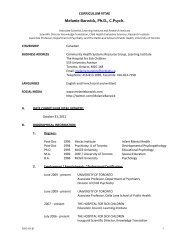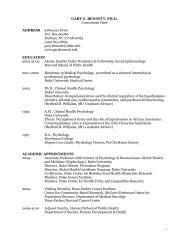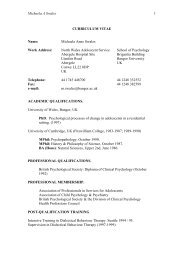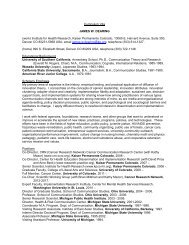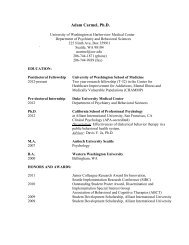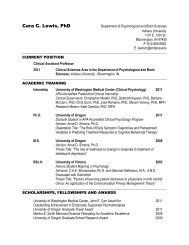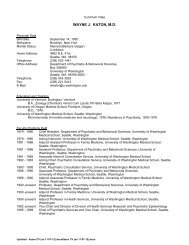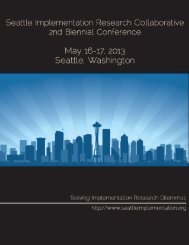Enhancing Self-Practice/Self-Reflection - Cambridge Journals
Enhancing Self-Practice/Self-Reflection - Cambridge Journals
Enhancing Self-Practice/Self-Reflection - Cambridge Journals
Create successful ePaper yourself
Turn your PDF publications into a flip-book with our unique Google optimized e-Paper software.
Behavioural and Cognitive Psychotherapy, 2010, 38, 473–477<br />
First published online 12 May 2010 doi:10.1017/S1352465810000238<br />
<strong>Enhancing</strong> <strong>Self</strong>-<strong>Practice</strong>/<strong>Self</strong>-<strong>Reflection</strong> (SP/SR) Approach<br />
to Cognitive Behaviour Training Through the Use of<br />
Reflective Blogs<br />
Paul Farrand<br />
Mood Disorders Centre, University of Exeter, UK<br />
Jon Perry and Sue Linsley<br />
University of Plymouth, UK<br />
Background: <strong>Self</strong>-<strong>Practice</strong>/<strong>Self</strong>-<strong>Reflection</strong> (SP/SR) is increasingly beginning to feature as<br />
a central component of CBT training programmes (Bennett-Levy et al., 2001). Programmes<br />
including a reflective element, however, are not unproblematic and it has been documented that<br />
simply setting time aside for reflection does not necessarily result in trainees using such time<br />
to reflect. Such limitations may be overcome by including a requirement to post reflections<br />
on reflective blogs. Aim: To examine the effect that a requirement to contribute to a reflective<br />
blog had upon a SP/SR approach to CBT training. Method: A focus group methodology<br />
was adopted with data analyzed using a general inductive qualitative approach. Results: The<br />
requirement to use blogs to reflect upon the self-practice of CBT techniques enhanced SP/SR,<br />
established a learning community, and improved course supervision, although some technical<br />
difficulties arose. Conclusions: Consideration should be given towards using reflective blogs<br />
to support a SP/SR approach to CBT training. Benefits afforded by the use of reflective blogs<br />
further establish SP/SR as a valid and flexible training approach.<br />
Keywords: <strong>Self</strong>-practice, self-reflection, blog, training, qualitative.<br />
Introduction<br />
There is renewed interest in developing and refining a reflective approach towards the<br />
training of cognitive behavioural therapists (Bennett-Levy et al., 2001; Bennett-Levy, 2006).<br />
<strong>Self</strong>-<strong>Practice</strong>/<strong>Self</strong>-<strong>Reflection</strong> (SP/SR) is based on the premise that techniques in cognitive<br />
behavioural therapy (CBT) can be effectively learnt through trainees practising the techniques<br />
on themselves then reflecting on this practice (Bennett-Levy et al., 2001; Bennett-Levy, 2006).<br />
Specific benefits have been reported to arise with SP/SR such as improving communication of<br />
the conceptual framework of CBT, increased attention to the therapeutic relationship, empathic<br />
attunement, therapist self-reflection and therapeutic flexibility (Bennett-Levy et al., 2001).<br />
Reprint requests to Paul Farrand, Mood Disorders Centre School of Psychology, Washington Singer Laboratories,<br />
Perry Road, University of Exeter, Exeter EX4 4QG. E-mail: p.a.farrand@exeter.ac.uk<br />
© British Association for Behavioural and Cognitive Psychotherapies 2010
474 P. Farrand et al.<br />
However SP/SR is not unproblematic, with challenges associated with the self-reflection<br />
component. Central amongst these is the observation that setting time aside within courses for<br />
reflection does not necessarily result in trainees using such time to reflect (Boud and Walker,<br />
1998). Rather, to promote self-reflection, activities should be framed within the learning context<br />
of the course, to provide direction and be well planned and supported to ensure trainees are<br />
aware of the process and course requirements (Boud and Walker, 1998).<br />
Potentially the use of blogs, a freely accessible web-based communication tool, provides<br />
an ideal way to establish an appropriate and structured learning context to support reflective<br />
practice. Providing a personal learning space to enable trainees to interact around study topics<br />
has been central amongst several proposed uses of blogs within teaching and learning. Little<br />
has been reported concerning the use of blogs to support psychotherapy training. This is<br />
surprising given the emphasis such training places upon reflective practice (Schön, 1983).<br />
Using a focus group methodology, this small study seeks to examine the benefits and<br />
limitations of using reflective blogs to support a SP/SR approach towards CBT training.<br />
Method<br />
Participants<br />
Participants were 19 (4 male, 15 female) health and allied health professionals with a mean of<br />
18.8 years’ experience. All had completed a postgraduate module in adjuvant CBT, and none<br />
had previous CBT training.<br />
SP/SR course requirements<br />
The module comprised five teaching days delivered 3 weeks apart to give trainees enough time<br />
to practise and reflect on the CBT techniques and then post these on the blog. A supervision<br />
day was then provided 2 months after the last teaching day, allowing trainees enough time to<br />
have further practised the techniques.<br />
The first day provided trainees with an appreciation of the core assumptions underlying<br />
CBT, discuss cognitive models and the SP/SR supervision model. Throughout the following<br />
4 days there was a strong emphasis upon skills development in five core CBT techniques:<br />
problem level formulation, guided discovery, cognitive restructuring, behavioural experiments,<br />
and activity scheduling. The approach to training was participative and experiential. Each day<br />
began with a 90-minute group supervision session based around the CBT technique previously<br />
covered. This was followed by introductions to the next CBT technique to help trainees gain<br />
an appreciation of the procedural aspects of the technique. Role play was not used as it was<br />
felt that SP/SR would provide a substitute for the learning of procedural skill.<br />
Recording SP/SR reflections using structured blogs for each of the CBT techniques was a<br />
formal course requirement, although not part of module assessment. During the first teaching<br />
session trainees were given a copy of a seminal SP/SR paper (Bennett-Levy et al., 2001) and<br />
asked to consider the paper to establish shared SP/SR ground rules for the following session.<br />
Trainees were informed that they were required to post at least one reflective blog for each<br />
of the CBT techniques learnt during the course. A deadline of a week prior to the following<br />
teaching session was set for all posts to enable the course tutor to synthesize reflections to<br />
inform the subsequent supervision session.
<strong>Enhancing</strong> <strong>Self</strong>-<strong>Practice</strong>/<strong>Self</strong>-<strong>Reflection</strong> 475<br />
The reflective blog<br />
Trainees were taught how to access and post a reflective blog during their second teaching<br />
session. Blogs were easily created using a standard blog tool included within the universities’<br />
electronic managed learning environment (Blackboard). A separate blog was established for<br />
each of the five CBT techniques covered during the course.<br />
Trainees were not instructed in any form of reflection but asked to summarize what they<br />
had learnt about the respective CBT techniques, commenting in particular on what they found<br />
useful and difficult. The course leader [PF] posted to each blog on at least one occasion to<br />
motivate those who had already posted or encourage those still to post. As established during<br />
the setting of ground rules, blog postings included the name of the contributing trainee, but it<br />
was stressed that reflections should contain no confidential patient information.<br />
Methodology<br />
At the end of the module all trainees were invited and agreed to participate in a focus group to<br />
discuss their experience of using reflective blogs to support SP/SR. A focus group methodology<br />
was chosen, given its suitability to examine not only what people think but also the reasons as<br />
to why they think that way. Each focus group included an experienced facilitator and scribe,<br />
with questions based upon previous research into SP/SR (e.g. Bennett-Levy et al., 2001) and<br />
into the use of blogs to support teaching and education (e.g. Williams and Jacobs, 2004). To<br />
avoid potential bias the lead author and course teacher [PF] did not participate in the focus<br />
groups.<br />
Analysis<br />
Focus groups were audio-taped, with data gathered complemented by a practitioner-researcher<br />
self-study approach (Bennett-Levy et al., 2001). Each audio-tape was transcribed verbatim,<br />
with subsequent organization and analysis supported with N5 software. A general inductive<br />
approach was adopted as the basis of the initial thematic analysis undertaken by the author<br />
[PF] and a researcher not associated with the project, with additional steps taken to ensure<br />
rigour (Pope, Ziebland and Mays, 2000).<br />
Results<br />
<strong>Enhancing</strong> <strong>Self</strong>-<strong>Practice</strong>/<strong>Self</strong>-<strong>Reflection</strong><br />
Motivated <strong>Self</strong>-<strong>Practice</strong>/<strong>Self</strong>-<strong>Reflection</strong>. The requirement to post reflections on the blogs<br />
helped participants establish the value of practising CBT techniques on their own. This was<br />
mainly achieved by the blog providing participants with the ability to read others’ reflections<br />
that highlighted the value of reflecting on practice.<br />
Structured <strong>Self</strong>-<strong>Practice</strong>/<strong>Self</strong> <strong>Reflection</strong>. The use of blog posting deadlines ensured that<br />
participants actively engaged in SP/SR. Interestingly, participants indicated that the visibility<br />
of knowing who had posted to the blog served as encouragement to post reflections by<br />
the deadline. Presumably the lack of anonymity about who had not posted served to place<br />
participants under a certain amount of peer group pressure to conform to the SP/SR process.
476 P. Farrand et al.<br />
Learning community<br />
The reading and sharing of trainees reflective posts helped to establish a sense of support from<br />
within the teaching group and normalize the learning experience. Reading blog postings helped<br />
participants become aware that others were also experiencing similar difficulties learning<br />
the CBT techniques. The reflective blog also reinforced that learning was taking place; the<br />
chronological postings on the blog served as an historical reflective record that demonstrated<br />
increased understanding and competence with increased practice.<br />
<strong>Enhancing</strong> the process of <strong>Self</strong>-<strong>Reflection</strong><br />
Several participants highlighted how the reflective postings of other trainees provided examples<br />
regarding the skill of reflection, enabling them to challenge and adapt their own reflective<br />
process. Additionally, the process came to be seen as an enjoyable learning experience, further<br />
enhancing a willingness to engage.<br />
Improved course supervision<br />
A review of the blog content was used to help set the agenda for the group supervision session<br />
provided at the beginning of each teaching day. This helped to inform the content of the<br />
supervision session whilst establishing a sense that the session was shared and relevant to all<br />
trainees.<br />
Problems with the reflective blog<br />
Skills teaching. The course was developed without the use of role play as it was felt that<br />
the SP/SR process would enable trainees to gain competence in the CBT techniques alone.<br />
Participants, however, felt that the need remained to have some opportunity to be watched<br />
using the CBT techniques to ensure they were being undertaken correctly, prior to engaging<br />
in SP/SR.<br />
Technical problems. Several participants reported a range of technical difficulties<br />
accessing the blog, particularly with respect to knowledge in accessing web sites and using<br />
passwords. Additionally, in some cases participants were unable to access the blogs from work<br />
as trust security restrictions were placed upon website access.<br />
Discussion<br />
Results of this small study highlight ways in which SP/SR can be enhanced through the addition<br />
of reflective blogs. Several benefits were associated with increasing trainee engagement with<br />
the process and overcoming poor trainee participation (Boud and Walker, 1998).<br />
Including a requirement to post reflections on the blog potentially places SP/SR at the centre<br />
of the learning experience, due both to the availability of the posts by other trainees, and the<br />
synthesis of the posts to inform the group supervision sessions. Requiring posts to include the<br />
contributor’s name promotes the idea that learning is not undertaken in isolation but as part of<br />
a learning community. This contributed not only to a sense of peer pressure to engage in the<br />
SP/SR process (Boud and Walker, 1998) but also helped to normalize the learning experience
<strong>Enhancing</strong> <strong>Self</strong>-<strong>Practice</strong>/<strong>Self</strong>-<strong>Reflection</strong> 477<br />
by enabling trainees to realize that difficulties in learning techniques are often commonplace.<br />
These beliefs were aided by the availability of the chronological posting of reflections on the<br />
blog, which helped trainees appreciate that difficulties can be overcome through continued<br />
SP/SR.<br />
SP/SR blogs also brought about improvements in the quality of the reflective skills. Whilst<br />
blog posts are initially quite diverse in style and content, it is common for a distinctive style of<br />
blog posting to emerge, given the ability to read previous entries (Williams and Jacobs, 2004).<br />
The distinctive style became set by those reflective blog entries that were identified as being<br />
of the highest quality, and so setting the standard for other trainees’ posts. Furthermore, the<br />
knowledge that all postings would be read and possibly scrutinized by others potentially forces<br />
trainees to confront their own opinions more comprehensively and consider how these would<br />
be reflected upon within their peer group (Williams and Jacobs, 2004). This may promote<br />
a deeper level of reflection (Oravec, 2002) than would otherwise be produced were trainees<br />
merely required to reflect in their own time.<br />
Alongside benefits, the study also points to two main limitations. SP/SR supported by<br />
reflective blogs should not be used in isolation from other training techniques, such as roleplay.<br />
Rather it should be seen to complement such techniques as proposed within the DPR<br />
model of therapist skill development (Bennett-Levy, 2006). The other difficulty arose as a<br />
consequence of the use of computer-based technology to support the reflective blog. Clearly,<br />
consideration needs to be given towards supporting trainees who may be less familiar with<br />
such technologies. Appreciating which factors serve as barriers to the uptake of computerized<br />
CBT may inform ways to provide such support.<br />
In conclusion, this study highlights the potential that utilizing reflective blogs to support<br />
SP/SR has in establishing an effective and flexible CBT training approach. With due<br />
consideration given to the identified limitations, the approach has the potential to increase<br />
training capacity at a time when demand for CBT training is high due to the roll out<br />
of Improving Access to Psychological Therapies. Indeed, several Psychological Wellbeing<br />
Practitioner training programmes have now adopted the SP/SR approach supported by<br />
reflective blogs.<br />
References<br />
Bennett-Levy, J. (2006). Therapists skills: a cognitive model of their acquisition and refinement.<br />
Behavioural and Cognitive Psychotherapy, 34, 57–78.<br />
Bennett-Levy, J., Turner, F., Beaty, T., Smith, M., Paterson, B. and Farmer, S. (2001). The value of<br />
self-practice of cognitive therapy techniques and self-reflection in the training of cognitive therapists.<br />
Behavioural and Cognitive Psychotherapy, 29, 203–220.<br />
Boud, D. and Walker, D. (1998). Promoting reflection in professional courses: the challenge of context.<br />
Studies in Higher Education, 23, 191–206.<br />
Oravec, J. (2002). Bookmarking the world: weblog applications in education. Journal of Adolescent<br />
and Adult Literacy, 45, 616–621.<br />
Pope, C., Ziebland, S. and Mays, M. (2000). Qualitative research in health care: analysing qualitative<br />
data. British Medical Journal, 320, 114–116.<br />
Schön, D. A. (1983). The Reflective Practitioner. New York: Basic Books.<br />
Williams, J. B. and Jacobs, J. (2004). Exploring the use of blogs as learning spaces in the higher<br />
education sector. Australasian Journal of Educational Technology, 20, 232–247.


